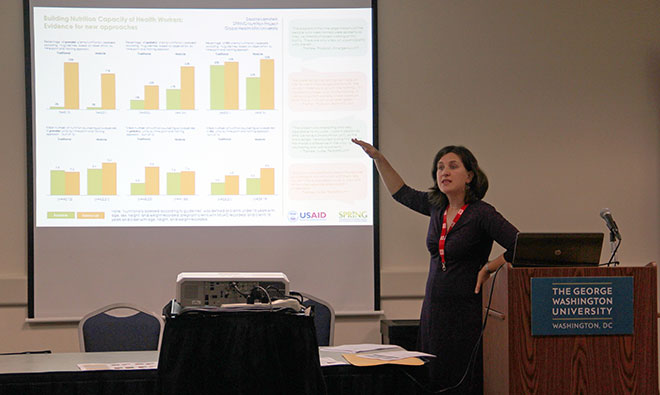
During her presentation “Building Nutrition Capacity of Health Workers” at the 15th annual Global Health Mini-University, Dr. Sascha Lamstein, Technical Advisor and Team Lead for SPRING, presented on the critical role of the health workforce in improving nutritional status, SPRING’s Nutrition Workforce Mapping Toolkit for assessing the preparedness of the health workforce for providing nutrition assessment, counseling, and support (NACS) services, as well as findings from operations research on approaches to training the health workforce on NACS in Haiti. This toolkit helps nutritionists, program managers, human resources managers, and others involved with improving delivery of nutrition actions assess essential elements of the nutrition workforce and health facilities, and can help inform trainings for health facility staff.
Strengthening health services is considered critical to improving nutrition, and an important aspect of that is capacity building. Unfortunately, a global shortage of health workers impedes the community’s efforts to address nutritional shortfalls, and there is a gap in evidence as to which training methods are most effective.
As part of SPRING’s work expanding and strengthening NACS, SPRING worked in 19 tertiary care facilities in Haiti. Health facilities chose which type of training to incorporate – on-the-job or traditional – and SPRING conducted baseline research in 2014 and follow-up data one year later to learn how the trainings had proceeded.
Key findings were varied, highlighting pros and cons for each method. During her presentation, Dr. Lamstein used a “data placemat” to engage attendees in interpreting the findings from SPRING’s research. Both qualitative and quantitative data were included. Although the group was unable to pinpoint a single training method that would be most effective for future work, there was productive conversation about training methods and ideas for further uses of research.
The Global Health Mini-U was held on March 4, 2016 at George Washington University in Washington, D.C. The free conference attracts students, public health experts, non-profits, researchers and other professionals interested in the world of public health and development.
Building Nutrition Capacity of Health Workers: Evidence from Haiti (PDF, 74 KB)